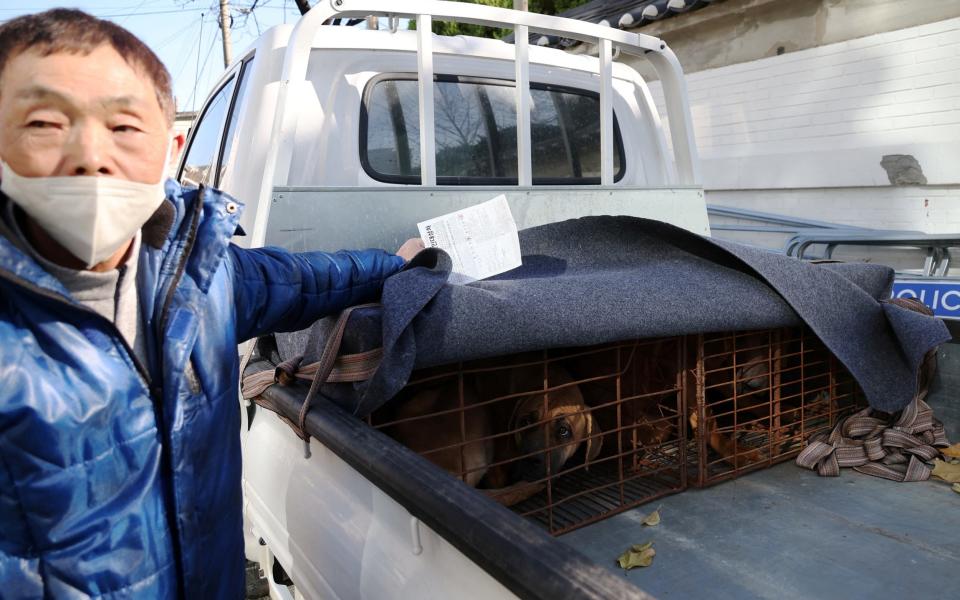South Korean dog meat farmers took caged dogs to a protest against plans to ban their consumption after threatening to flood the capital’s streets with two million canines.
About 200 farmers, restaurant owners and others in the dog meat industry gathered on Thursday for the rally in Seoul, where protesters scuffled with police outside the presidential office.
Tempers flared when the officers turned away a dozen trucks loaded with nearly 100 dogs that farmers had intended to release onto the street. Three protesters were detained.
Others chanted slogans, raised their fists and took turns making defiant speeches against the government’s plans to outlaw the breeding and sale of dog meat for consumption.
One protester said he would kill himself if officials move ahead with the legislation.
“We’ll fight. We’ll fight,” the demonstrators shouted.

The Korea Dog Meat Farmers’ Association, which has long opposed moves to crack down on the industry, had threatened to release two million dogs near government landmarks in the capital as well as near the homes of ministers and other lawmakers.
Earlier this month, the government pledged to introduce legislation by the end of this year that would ban the centuries-old practice of eating dog meat and bring South Korea into line with the wider region.
Hong Kong, Taiwan, Thailand and Singapore already have such restrictions in place.
A majority of Koreans oppose the eating of dogs and have never tried the meat.
Instead, they make up a nation of dog lovers – with more than six million households out of 51 million owning them as pets, inspiring a flourishing industry of animal accessories.
Yoon Suk Yeol, the president, and his wife Kim Keon-hee, own six dogs, including a retired guide dog and a rescue dog.
A Gallup Korea poll last year showed almost two thirds of respondents opposed eating dog meat. Just 8 per cent said they had eaten it within the past year.
South Korea, known more widely for its vibrant K-pop culture and gritty K-dramas, is also increasingly worried about its international reputation over the controversial practice.
Global celebrities like American actress Kim Basinger and French actress Brigitte Bardot have called for a ban.
Under the new bill, the dog meat industry would be phased out by 2027 and farmers would be offered financial support to dismantle their facilities and diversify into new lines of business.
However, the industry is calling for a longer grace period and direct financial compensation.
Some oppose the ban as a matter of principle. Ju Yeong-bong, who represents an industry group and led Thursday’s rally, denounced the government for closing down an industry and ruling on what citizens choose to eat.
“We can’t agree with the idea that it is barbaric, because all countries that have the tradition of animal husbandry have at some point eaten dogs and there are still countries where it’s done,” he said.
According to a government study last year, there are 1,150 dog farms in Korea which are collectively raising more than 520,000 dogs for consumption. Those figures mark a dramatic 35 per cent drop compared to five years ago.
Dog meat traders, however, claim there are more than 3,500 dog farms nationwide.
The Humane Society International/Korea, which has long campaigned for the outlawing of dog meat consumption and has rescued dogs from 18 squalid farms across the country, said the small but vocal farmer associations were not “representative of a great many dog farmers who can see the writing is on the wall for this cruel and anachronistic industry”.
Sangkyung Lee, one of the group’s campaigners, said the best thing the associations could do was to help farmers in the adjustment phase.
“What we need right now is calm and measured negotiation so that all sides can work together to sunset this industry and consign killing dogs for human consumption to Korea’s history books,” he said.

